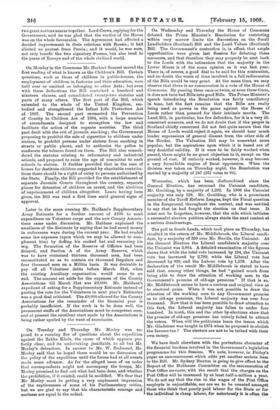On Wednesday and Thursday the House of Commons debated the
Prime Minister's Resolution for restricting within very narrow limits the discuesions On the Small Landholders (Scotland) Bill and the Land Values (Scotland) till. the Government's Contention is, in effect, that ample Opportunities were given lag &Won for debating these measures, and that therefore they may properly be sent back to the Lords with the intimation that the majority in the Lower House is of the same opinion as it was last year. There is, of &mite, a good deal to be said for this Contention, and no doubt the waste of time involved in a full rediscussion of the Bills would be very great. At the same time, we may observe that there is no consecration in a vote of the House of Commons. By passing them once or twice, or even three times, it does not turn bad Bills into good Bills. The Prime Minister's speech introducing the Resolution was fairly conciliatory in tone, but the fact remains that the Bills are really being used as pawns in the game against the House of Lords rather than pressed for their intrinsic merits. The Land Bill, in particular, has few defenders, for it is a very ill- conceived measure, and we do not doubt that if the people in Scotland chiefly concerned did not feel quite secure that the House of Lords would reject it again, we should hear much louder expressions of general dissent from the other side of the Border. The Valuation Bill may be somewhat more popular, but the aspirations upon which it is based are of very doubtful validity. If it were to be fairly worked when passed, there might be no great objection to it, except on the ground of cost. If unfairly worked, however, it may become a very formidable engine of fiscal oppression. When the division was taken on Thursday night, the Resolution was carried by a majority of 247 (331 vetes to 84).




































 Previous page
Previous page